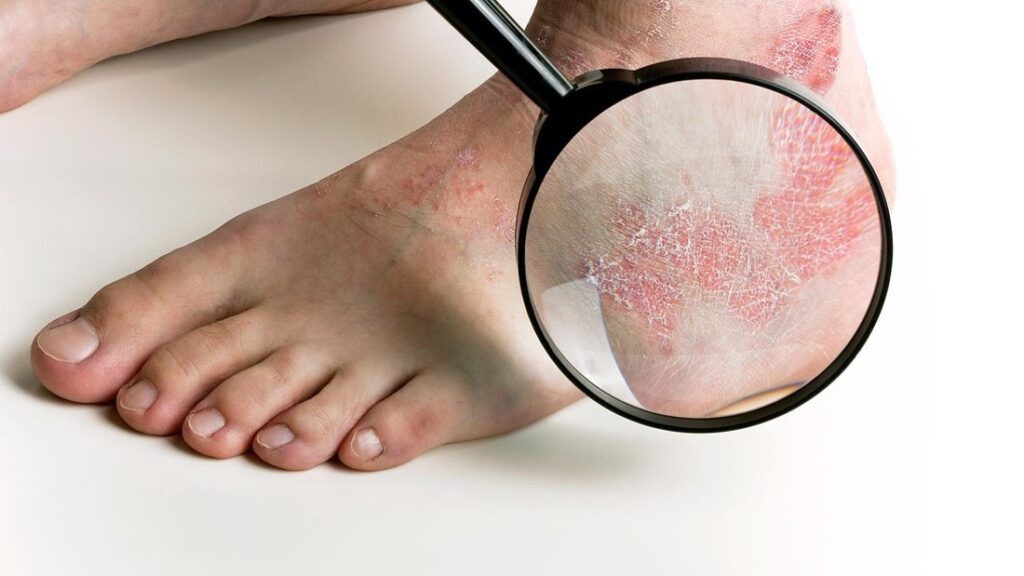As individuals age, they may experience new skin conditions, one of which is Psoriasis (PsO). PsO is an inflammatory skin condition caused by overactive skin cells which multiply excessively, leading to the formation of red, scaly patches on the skin. These patches can be itchy or painful and often appear on the feet, hands, body folds, and nails. Aging with psoriasis can be a problem or it could be a part of life that is managed to keep symptoms from bothering you too much.
Factors Contributing to Psoriasis in the Elderly

Research indicates that genetics might play a significant role in the onset of late-life PsO, though lifestyle and environmental factors are also influential. Triggers for PsO in older adults may include beta-blocking medications. Additionally, health conditions like hypertension, diabetes, and obesity are known to contribute to the development of Psoriasis.
Prevalence of Psoriasis Among Older Adults
Psoriasis is, regrettably, a common condition in the elderly. The severity of Psoriasis in seniors can be worsened by other health issues such as type 2 diabetes, inflammatory bowel disease, and heart disease. Although non-contagious, aging with psoriasis often ends up with the disease becoming a chronic condition, and no known cure is currently available.
Understanding the Root Cause of Psoriasis
The precise cause of Psoriasis remains elusive. However, scientific research has identified genes and the immune system as significant factors in its development. In psoriasis cases, T-cells abnormally attack the body’s skin cells, prompting an accelerated production of new cells. This autoimmune response is ongoing throughout the individual’s lifetime. Psoriasis also has a familial tendency, though it’s observed that some people with a genetic predisposition never develop it, while others without the predisposing gene can still get the disease. Researchers have also identified several factors that can trigger Psoriasis:
1. Climate Conditions
Cold, dry climates can aggravate psoriasis symptoms. Low temperatures and heating systems can deplete skin moisture, irritating the condition. Minimizing exposure to harsh weather and using a humidifier at home can be beneficial.
2. Food triggers
While there’s no specific diet for Psoriasis, individuals with the condition might benefit from avoiding certain foods like:
- Dairy items.
- White flour products.
- Gluten-containing grains and condiments.
- Nightshade vegetables like tomatoes, eggplants, and white potatoes.
- High-sugar and fatty foods.
- Shellfish and pork.
- Red meats.
A 2017 national survey indicated symptom improvement in people with Psoriasis who reduced or eliminated these foods, particularly nightshade plants and gluten.
3. Sun Exposure
Excessive sun exposure can trigger psoriasis outbreaks. While moderate sun can alleviate symptoms for some, sunburns are likely to worsen them. Limited sun exposure is recommended for symptom relief.
4. Infections
Common infections like strep throat, thrush, and upper respiratory infections can initiate psoriasis flare-ups. Prompt treatment from a healthcare provider is recommended upon suspecting such bacterial infections. Less common or viral infections, such as HIV, can also worsen psoriasis symptoms.
5. Hormonal Influences
Research from a 2015 review suggests that low estrogen levels may trigger Psoriasis in women. This connection explains why symptoms often worsen during puberty and menopause and improve during pregnancy.
6. Alcohol
Studies on alcohol’s effect on Psoriasis are limited but suggest it can worsen symptoms, especially in women. A 2010 study noted an increase in Psoriasis among women consuming non-light beer, possibly due to the starch content. A 2011 study linked alcohol consumption to increased inflammation and infection risk, aggravating Psoriasis. With alcohol misuse prevalent in about one-third of psoriasis patients and increased alcohol-related disease risks, those with Psoriasis should check and limit their alcohol consumption.
7. Skin Injuries
Skin injuries, including bug bites, cuts, scrapes, or even minor wounds from daily activities like shaving or gardening, can develop new psoriasis lesions in affected areas. This type of trigger is specific to individuals already diagnosed with Psoriasis.
8. Smoking
Those with Psoriasis should avoid smoking and exposure to passive smoke. Tobacco use can irritate psoriasis symptoms and potentially interact with psoriasis medications. A 2006 study indicated that smoking might increase the risk of developing palmoplantar pustular Psoriasis, which affects the hands and feet. While smoking is a significant risk factor for Psoriasis, it’s not the sole cause. It can also aggravate other psoriasis-related comorbidities, such as heart disease, obesity, and arthritis.
9. Obesity
Obesity not only raises the risk of developing Psoriasis but also worsens its symptoms. A 2013 JAMA Dermatology study showed that a low-calorie diet improved psoriasis symptoms and overall quality of life in obese individuals.
10. Specific Medications
Certain medications can disrupt the body’s autoimmune response, potentially triggering severe psoriasis attacks. These include beta-blockers and ACE inhibitors for high blood pressure, antimalarial pills, lithium, prednisone, hydroxychloroquine, and interferon-alpha for hepatitis C treatment. Patients with Psoriasis must inform their healthcare providers about their condition when prescribed these medications. While steroidal medicines can be beneficial during psoriasis flare-ups, their rapid withdrawal may trigger severe outbreaks.
11. Stress and Tension
Stress is both a consequence and a trigger of Psoriasis. Managing stress is crucial, with practices like mindfulness, yoga, and meditation proving effective in alleviating stress-related pain.
12. Specific Nutrients
The amino acid taurine and the nutrient choline might contribute to triggering Psoriasis. Elevated levels of these nutrients have been found in psoriatic lesions, according to 2016 research. While the body naturally produces taurine, it’s also present in meat, fish, and energy drinks. Similarly, the body synthesizes choline, but it is abundant in liver, eggs, animal products, soybeans, wheat germ, and potatoes.
Is it possible to get Psoriasis at 70?
Psoriasis can emerge at any stage of life, even in those who are 70 years or older. The condition, which affects people of any gender or race, may fluctuate in severity over time, either improving or worsening.
Consequences of Not Treating Psoriasis
Leaving Psoriasis untreated can lead to worse symptoms and complications like psoriatic arthritis and diabetes. Untreated Psoriasis typically results in severe itching and pain, affecting the skin’s health. Inflammation from untreated Psoriasis can cause additional complications in other body parts. The disease’s progression, if not managed, diminishes the quality of life, making treatment crucial to prevent further health issues.
Psoriasis Symptoms and Long-term Health Risks
Psoriasis presents both short-term and long-term symptoms. Short-term symptoms include:
- Dry, cracked skin.
- Thick, discolored skin patches with silvery scales.
- Thickened, pitted nails.
Long-term health risks associated with Psoriasis include:
Psoriatic Arthritis: This condition, involving joint pain and swelling, typically develops 7-10 years after psoriasis onset. Risk factors include obesity, severe psoriasis, joint or bone injuries, and infections. Untreated psoriatic arthritis can lead to severe disability.
Cardiovascular Disease: The immune response in Psoriasis can increase the risk of heart-related conditions, including heart attacks, strokes, heart failure, arrhythmias, and valve issues.
Metabolic Syndrome: Often linked with severe Psoriasis, metabolic syndrome includes conditions like high blood pressure, cholesterol, blood sugar, insulin resistance, and abdominal obesity.
Type 2 Diabetes: Individuals with Psoriasis may have an increased risk of developing type 2 diabetes.
Kidney Disease: Psoriasis is linked to an increased risk of kidney disease, characterized by impaired blood filtration in the kidneys.
Inflammatory Bowel Disease: Psoriasis patients have a heightened risk of developing inflammatory bowel diseases due to gastrointestinal tract inflammation.
Mental Health Issues: Psoriasis can significantly impact self-esteem, leading to mental health issues like depression and anxiety, especially due to visible symptoms and potential stigma.
Life Expectancy with Psoriasis
While there is no cure for Psoriasis, various treatments are available to manage its symptoms. Diagnosing individuals with Psoriasis largely depends on finding and adhering to an effective treatment plan. Patients often have concerns about the disease’s progression and impact on life expectancy, highlighting the importance of proper treatment and management.
Psoriasis Treatments
Recognizing Psoriasis as a serious skin condition is crucial. Those experiencing symptoms should seek medical advice promptly to prevent the condition from worsening and causing further health complications. Discussing symptoms with a healthcare provider is the first step towards effective management.
The primary treatments for Psoriasis include topical solutions like prescription creams and shampoos, as well as systemic treatments such as immunosuppressants. These treatments address the immune system and manage associated conditions like lung and kidney issues or hypertension. It’s essential to obtain these treatments through a healthcare professional.
Natural remedies can also supplement conventional psoriasis treatments, particularly for older individuals affected by the condition. However, it’s important to consult a doctor before trying any alternative treatments, which may include:
Salt Baths: Soaking in Epsom salts for 15 minutes can help alleviate scales and itching. Post-bath moisturizing is important to prevent skin dryness.
Apple Cider Vinegar: An apple cider vinegar and water diluted solution can reduce itching. This should be used in small amounts and avoided on open wounds.
Healthy Diet: Maintaining a balanced diet can regulate weight, potentially reducing symptoms, especially in overweight individuals.
Aloe Vera: Creams containing 0.5% aloe vera offer temporary relief and can be applied thrice daily.
Avoiding Psoriasis Triggers
Aging with psoriasis involves mostly prevention. Understanding personal triggers is key to preventing and managing psoriasis outbreaks. While it’s challenging to avoid all triggers, practical steps can significantly reduce the likelihood of flare-ups:
- Regularly moisturize your skin to prevent dryness.
- Adjust your diet to minimize common triggers, including alcohol.
- Always carry sun protection, such as hats and sunscreen.
- Avoid extreme temperatures.
- Quit smoking.
- Maintain a moderate weight.
- Take precautions to prevent skin injuries during activities, including using protective clothing and insect repellent.
- Engage in stress-reducing activities like exercise or mindfulness.
Research and Future Outlook for Psoriasis
Medical research continually explores new avenues for psoriasis treatment, focusing on areas like gene therapy, novel approaches to prevent skin reactions to the immune system, and understanding the link between Psoriasis and conditions like obesity, hypertension, and diabetes. While there’s currently no cure for Psoriasis, ongoing treatment developments offer hope. Patients must consult their healthcare providers to determine the most suitable treatment options.
Elderly Care from Ensocure Integrated Medicine

Aging with psoriasis and other lifestyle diseases in India doesnt have to be impact your quality of life. If you are currently in need of elderly home care in Bengaluru for ailing relatives or your loved ones, then Ensocure Integrated Medicine can help. Ensocure is a Bengaluru home healthcare company focusing on making medical assistance accessible to everyone at home. We focus on elderly care ranging from live in assistants, customized food delivery, diagnostics, nursing, and medical concierge services in Bengaluru. We employ certified and highly trained caregivers who take care of your elderly at home, coordinating with doctors, GP, and specialists so that you don’t have to worry about a thing. For more information call +91 63621 91675.

